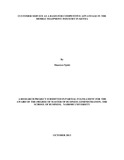| dc.description.abstract | Global competition and technological developments have dramatically increased product knowledge and available alternatives to customers. Armed with information, customers have become more sophisticated and demanding. Customers, as a result, have rising expectations of firms and its products. Further due to proliferation of the market by a number of providers offering the same service, delivering superior customer value and satisfaction are crucial to the competitive edge of a firm. The Kenyan telecommunication landscape is painted by four key mobile telephony service providers competing in offering service to customers in the telephony industry. Over the past decade the information and telecommunications (ICT) sector has been
among the major drivers of economic growth for Sub-Saharan Africa. It expected that the
sector will still be the driving force of fundamental economic change within the continent thus intensifying competition in the industry even further. Evidence suggests that the recent interest in competitive strategy and competitive positioning, while good in itself has resulted in the management of many firms placing too much emphasis on competitive performance and too little emphasis on customer expectations. This study seeks to determine latent effects of customer service quality dimensions as relevant to mobile telephony service industry in Kenya an area that so far attracted very little research interest. A descriptive survey study was designed targeting the entire mobile telephony industry clients in Mombasa to establish whether a provider’s quality of
customer service was a competitive strategy that affected competitive advantage of the mobile telephony industry in Kenya. Stratified random sampling was used to sample the respondents at an outlet shop of each of the major service providers. Primary data was obtained from the respondents using structured questionnaire with closed end questions, administered at customer service contact points. Data analysis and report of findings was done using descriptive statistics in the form of tables, frequencies and percentages. For analyses of the relationships between independent and dependent variables regression analysis was used. The results showed that customer choice of a mobile service provider is greatly influenced by the quality of customer service that a provider gives to its customers. Specifically, the findings showed that effective
standards and procedures, good customer experience and ambience are important components of an organizations’ ability to gain competitive advantage. It is therefore recommended that the management of the mobile service providers consider putting in place the recommended steps seen as probable ways of ensuring that their customer service are improved to sharpen their competitiveness. | en |

